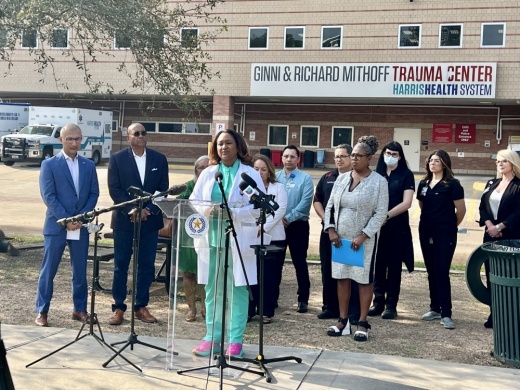Rice University's Baker Institute for Public Policy hosted a conference June 2, on National Gun Violence Awareness Day, to foster a nonpartisan dialogue and raise awareness about the threat to prevent injuries and create safer communities across the region. Since 2018, there has been a 76% increase in firearm-related trauma for children under 17 and a 76% increase in adults in Harris County, according to the Baker Institute.
The conference facilitated discussions on policy influences, community interventions and research-based prevention strategies to combat the firearm injury epidemic. Sponsored by Memorial Hermann, UTMB Center for Violence Prevention, UTHealth Houston and the Baylor College of Medicine, the conference aimed to develop proactive and informed approaches to firearm injury prevention.
"This is not about firearms; this is about bullet holes," said Dr. Rochelle Dicker, advisory board chair for the Health Alliance for Violence Intervention.
Dicker as well as Dr. Shiree Berry, vice chair of the Department of Surgery at HCA Houston Healthcare Northwest, shared their expertise on trauma care and violence prevention. Meanwhile, Houston City Council Member Abbie Kamin, Deputy Inspector General Crystal Okafor from One Safe Houston and Executive Assistant Police Chief Larry Satterwhite from the Houston Police Department provided insights on policy development, public safety and law enforcement's role in preventing firearm injury.
"We need resources for mental health and support, but we also need resources for law enforcement when it comes to data," Kamin said in regards to means of taking action.
The outcomes and recommendations from the conference will be published in a comprehensive report, ensuring the wide dissemination of insights and strategies, according to the event’s website. The Baker Institute will compile a full report.
By focusing on the consequences of firearm injuries rather than the firearms themselves, the panelists underscored the need to prioritize prevention and intervention strategies to address the physical harm inflicted by these incidents.
Satterwhite stressed concrete actions such as allocating mental health resources, updating data tracking systems, implementing safety requirements, and addressing domestic violence and red flag laws to combat gun violence.
Berry said she believes gun violence is deeply intertwined with health care. Reflecting on an 18-year-old patient who had been shot for the second time, she emphasized the impact of gun violence on individuals and communities.
"The ease in talking to the patient, the ease of him knowing where to get a gun is just mind-boggling," Berry said.
The panelists addressed the accessibility of firearms, highlighting the responsibility of health care professionals to engage in conversations about gun violence prevention. By integrating into the community and advocating for comprehensive solutions, the panelists said they believe health care professionals can make a difference in combatting the crisis.
Visit the Baker Institute website for more insight and to watch the event. More information about the topics discussed in the panel is available here.





